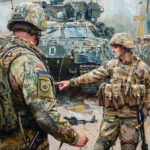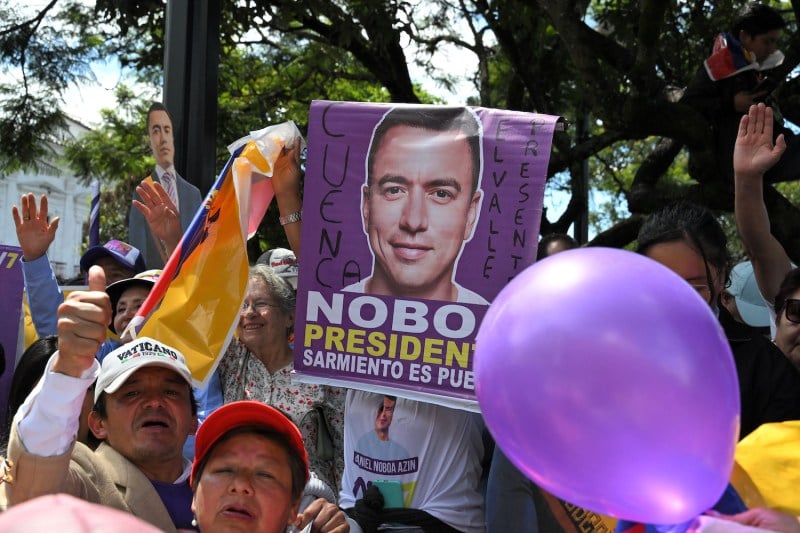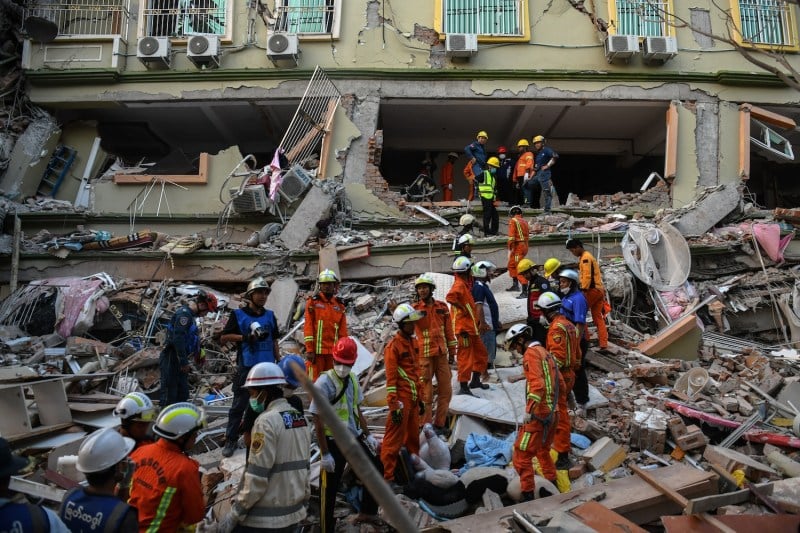China Prepares to Endure a Trade War

China Prepares to Endure a Trade War
After a tense week, what happens next?
Trucks are seen transporting containers in Qingdao Port, located in China’s eastern Shandong province, on Jan. 13. AFP / China OUT via Getty Images
Welcome to Foreign Policy’s China Brief.
The highlights this week: Beijing faces a strategic dilemma amid escalating trade conflict, rumors spread about a top-ranked general, and a long-awaited stimulus package could soon be a reality.
Welcome to Foreign Policy’s China Brief.
The highlights this week: Beijing faces a strategic dilemma amid escalating trade conflict, rumors spread about a top-ranked general, and a long-awaited stimulus package could soon be a reality.
Beijing Faces Strategic Dilemma on Trade
The White House has said that tariffs against China amounting to 104 percent have taken effect after Beijing refused to lift retaliatory tariffs—introduced after U.S. President Donald Trump’s big announcement last week—even after Trump threatened additional 50 percent tariffs in response.
Beijing has promised tough measures in response, calling Trump’s move a “mistake on top of a mistake” and pledging to “fight to the end.”
But the escalating trade conflict has left China with a strategic dilemma, and every potential approach is risky and painful. The Chinese political leadership made the same mistake as many people in U.S. institutions: They thought that Trump’s second term would look like his first, without realizing that guardrails were already broken.
China was preparing for a tense standoff over trade with the United States, like two gunslingers eyeing each other at high noon. But rather shooting his target, Trump began throwing dynamite. That is a problem for Beijing: The United States is doing collateral damage to bystanders or allies—but it might also blow up China in the process.
If the tariffs take full effect, the scenario isn’t good for anyone. China has leaned more heavily on exports following its failure to kickstart domestic consumption in the wake of the COVID-19 pandemic. Those goods have found new markets worldwide, but in the event of a likely global recession, those markets will contract.
However, Chinese supply chains are less dependent on the United States than U.S. supply chains are on China. China can find substitutes for almost everything that it imports from the United States, especially if more suppliers want to diversify their markets to cope with an unreliable Washington.
So, what happens next? The optimistic scenario, in which both sides talk themselves into the status quo ante or something close to it, involves diplomacy and flattery. Something like this prevailed during Trump’s first term, with a trade deal reached in January 2020—albeit largely unrealized due in part to the pandemic. This version is what China would prefer.
Yet Trump appears unwilling to accept any terms but supplication—and the language coming out of the White House leaves little room for Beijing to back down without suffering domestic political damage. Trump’s suggestion that China “wants to make a deal,” for example, makes it less likely that China will do so.
Chinese officials are used to massaging leaders’ egos—a key part of dealing with Trump. But it is now a contest of strength between Trump and Chinese President Xi Jinping; it will be difficult for Chinese analysts to suggest a way out that might undermine Xi. One of China’s premier think tanks was just shuttered, in part due to a researcher criticizing Beijing’s response to Trump’s initial announcement.
China’s response to Trump’s April 2 declaration was tough, not only imposing a 34 percent retaliatory tariff on the United States but also unleashing a wave of investigations into U.S. firms, placing some U.S. companies on its “unreliable entities” list, and imposing additional export controls on rare earths.
Such threats and punishments are the most likely immediate response. A real trade war is a contest in ability to endure pain. Economically, the United States before Trump’s return was doing considerably better than China. But the Chinese public is probably better at enduring the costs of a trade war than a polarized United States, where tariffs are also broadly unpopular.
One serious escalatory possibility would be China taking hostages, as it did most prominently after Canada arrested Huawei CFO Meng Wanzhou. This would most likely take place in the form of exit bans on U.S. businesspeople residing in or visiting China rather than arrests. A more aggressive posture—in the South China Sea, or toward Taiwan—that signals defiance to the United States is also possible.
If the crisis continues past this week, China could also encourage nationwide boycotts of U.S. goods, a measure deployed against countries such as South Korea in the past. A worst-case scenario would see public anger turn against U.S. targets in ways that the Chinese Communist Party (CCP) can’t fully control, as occurred during anti-Japanese riots in 2012, when mobs attacked schools and smashed up restaurants.
China could also try to punish some of the Southeast Asian countries, such as Vietnam, that are scrambling to cut deals with the United States by offering to purchase more U.S. security products. That seems unlikely, though, as Chinese leaders probably see Trump’s tariffs as an opportunity to bring these countries closer to Beijing, playing off anger and shock.
Even if the trade war escalates further, I expect that China is looking seriously at ways to pay off Trump, his relatives, or people that it thinks can influence his administration. Officials in Beijing have experience dealing with corrupt elites, even if it is usually on a smaller scale.
That approach could take the form of literal payouts or favorable terms for Trump-linked companies, especially since the administration has declared that it will no longer attempt to enforce U.S. laws on foreign corruption.
What We’re Following
Political purge watch. There are persistent rumors that one of China’s top-ranked generals, He Weidong, is under investigation. He, 67, is a Xi loyalist who has supported the leader’s anti-corruption crackdown; he also rose through the ranks in a People’s Liberation Army that is rife with corruption at every level, to which He is likely personally exposed.
But there is no official word of an investigation; the speculation is based on He’s failure to appear in public for a few weeks—something that has previously led dissidents astray in generating false stories of purges or defections. The CCP’s opaqueness, especially around leaders’ health, contributes to this trend; there is a chance that He is simply unwell.
One target is more certain: Liu Tianran, a financier and the son of former Vice Premier Liu He, is under investigation and has possibly been detained, according to Financial Times reports that cite multiple sources. Liu He headed trade talks during Trump’s first term and retired from the office in 2023. But crackdowns have targeted retired politicians before, and going after family members is often a first step.
Chinese soldiers in Ukraine. Ukrainian President Volodymyr Zelensky summoned the Chinese ambassador in Kyiv after two Chinese nationals were captured fighting for Russia, and he said that Ukraine has evidence of many more Chinese soldiers in the Russian ranks.
China supplying manpower to Russia would be a major escalation, but it seems unlikely. It is much more probable that the captured Chinese nationals were mercenaries employed by one of the many private military contractors (PMCs) that Russia uses.
Those PMCs often recruit soldiers from Central Asia, but their existing manpower pools may be drained—or these soldiers might be some of the many Chinese citizens residing in neighboring countries such as Kazakhstan or Mongolia. (Long wars have a way of drawing in unexpected participants, such as the Korean soldier captured by the United States on D-Day.)
FP’s Most Read This Week
- How to Ruin a Country by Stephen M. Walt
- Trump’s Wanton Tariffs Will Shatter the World Economy by Edward Alden
- Tariffs Can Actually Work—if Only Trump Understood How by Michael Hirsh
Tech and Business
Stimulus at last? Since the COVID-19 pandemic, Chinese investors and consumers have waited like farmers for rain for a stimulus package on the scale that China released in response to the 2008 global financial crisis. Though there have been stimulus efforts, Xi’s aversion to “welfare-ism” as well as his anxiety about potential side effects has kept them relatively small.
The U.S. tariffs may have finally moved the needle, however, with an accelerated stimulus package now under discussion and Xi saying that he will “unleash” domestic consumption. The problem is that Chinese households are generally cautious spenders in uncertain times, and after COVID-19 lockdowns, they don’t trust their own government or the U.S. government to keep things stable.
TikTok extension. A proposed deal to sell TikTok’s U.S. business was held up after China said in retaliation for U.S. tariffs that it wouldn’t approve the deal, prompting Trump to extend another 75-day stay on the U.S. banning the app (possibly illegally). The holdup was a reminder that TikTok, which is controlled by Chinese giant ByteDance, can’t make a deal without Beijing’s sign-off.
China hawks in the U.S. Republican Party have gone quiet on TikTok since Trump made defending it one of his interests after years of vocal opposition to the app.
James Palmer is a deputy editor at Foreign Policy. X: @BeijingPalmer
More from Foreign Policy
-

American flags are draped around tables and pipes in a small factory room as women work at sewing machines to produce them. Tariffs Can Actually Work—if Only Trump Understood How
Smart trade policy could help restore jobs, but the president’s carpet-bomb approach portends disaster.
-

Donald Trump looks up as he sits beside China’s President Xi Jinping during a tour of the Forbidden City in Beijing on Nov. 8, 2017. Asia Is Getting Dangerously Unbalanced
The Trump administration continues to create headlines, but the real story may be elsewhere.
-

Trump announces tariffs Trump’s Wanton Tariffs Will Shatter the World Economy
Economic warfare is also a test for U.S. democracy.
-

The Department of Education building in Washington, DC on March 24. Why Republicans Hate the Education Department
Broad popular support means that even Ronald Reagan failed at dismantling the agency.









Join the Conversation
Commenting on this and other recent articles is just one benefit of a Foreign Policy subscription.
Already a subscriber?
.
Subscribe
Subscribe
View Comments
Join the Conversation
Join the conversation on this and other recent Foreign Policy articles when you subscribe now.
Subscribe
Subscribe
Not your account?
View Comments
Join the Conversation
Please follow our comment guidelines, stay on topic, and be civil, courteous, and respectful of others’ beliefs.
Change your username |
Log out
Change your username:
CANCEL
Confirm your username to get started.
The default username below has been generated using the first name and last initial on your FP subscriber account. Usernames may be updated at any time and must not contain inappropriate or offensive language.